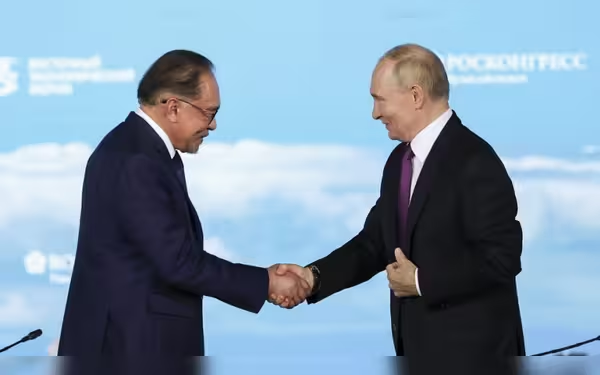Saturday, December 21, 2024 04:38 PM
Malaysia Strengthens Economic Ties with Russia Amid Global Isolation
- Malaysia's exports to Russia increased by 13 percent last year.
- Prime Minister Anwar Ibrahim met with President Putin to enhance trade.
- Malaysia diversifies trade partnerships despite geopolitical tensions.
 Image Credits: channelnewsasia
Image Credits: channelnewsasiaMalaysia enhances economic ties with Russia, increasing exports and fostering new trade partnerships amid global isolation.
In recent years, Malaysia has been making significant strides in strengthening its economic relationships, particularly with countries that have faced international isolation. One such country is Russia, which has been shunned by many nations due to its invasion of Ukraine. Despite the geopolitical tensions, Malaysia has found a way to deepen its economic ties with Russia, showcasing a pragmatic approach to international relations.
According to reports, Malaysia's exports to Russia saw a remarkable increase of 13 percent last year, reaching a total of US$619.3 million. This growth indicates a growing interest from Malaysia in engaging with the Russian market, even as other countries impose sanctions and limit their interactions with Moscow. The economic partnership between the two nations was highlighted during a recent meeting between Malaysian Prime Minister Anwar Ibrahim and Russian President Vladimir Putin at the Eastern Economic Forum held in Vladivostok.
During this meeting, which took place on September 5, 2024, both leaders expressed their commitment to enhancing bilateral trade and investment. This handshake between Anwar Ibrahim and Vladimir Putin symbolizes not just a diplomatic gesture but also a strategic move to explore new avenues for economic collaboration. Malaysia's willingness to engage with Russia could be seen as a calculated decision to diversify its trade partnerships and reduce reliance on traditional allies.
As the global economic landscape continues to shift, Malaysia's approach may serve as a model for other nations navigating complex international waters. By fostering relationships with countries that are often sidelined, Malaysia is positioning itself as a key player in the global economy. This strategy not only opens up new markets for Malaysian products but also allows for the exchange of technology and expertise.
Malaysia's deepening economic ties with Russia, despite the latter's controversial standing on the world stage, reflect a broader trend of nations seeking to adapt to changing geopolitical realities. As countries reassess their alliances and trade relationships, Malaysia's proactive stance may lead to new opportunities and partnerships that could benefit its economy in the long run. The world is watching closely to see how this relationship evolves and what it means for the future of international trade.













